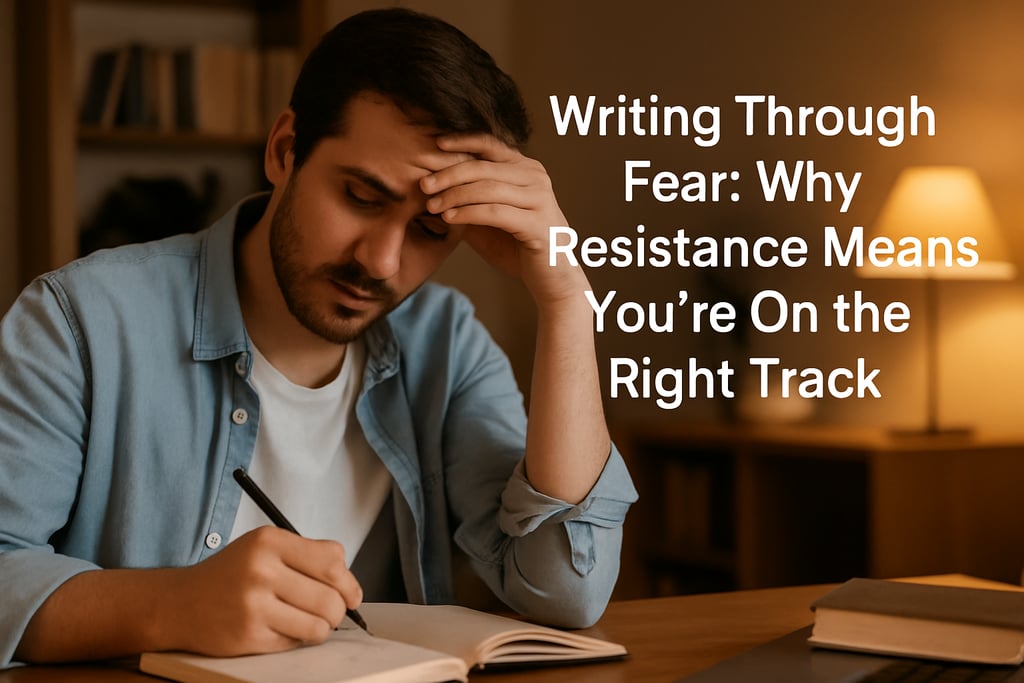Writing Through Fear: Why Resistance Means You’re On the Right Track
Struggling to write because of fear or self-doubt? Discover how to move forward with courage and how counselling can support creative blocks.
MENTAL HEALTH
Garry Ebrey. Diploma Counselling. Accredited Counsellor.
7/9/20253 min read


Writing Through Fear: Why Resistance Means You’re On the Right Track
What you’re feeling right now—the knot in your chest, the second-guessing, the restless energy—is exactly what people feel when they’re doing something that really matters.
That fear? That resistance? It’s not a sign you’re failing. It’s a sign you’re getting close to something deeply important. That ache in your chest, the butterflies in your ribs, even the thrill behind your eyes—those are signals. You care. And when you care, fear shows up to keep you safe. But it doesn’t get to run the show.
Let’s talk about how to work with that fear—not banish it, not fight it, but collaborate with it like a reluctant co-author. Here’s how.
1. Let the Fear Ride Shotgun—Not Drive
You don’t have to eliminate fear to keep writing. You just have to stop letting it steer. When the thoughts come—“What if I’m not good enough?” “What if this doesn’t make sense?”—pause and gently reply:
“Thanks for trying to keep me safe. I’m still going to do this.”
That inner critic isn’t trying to ruin you. It’s trying to protect you from vulnerability and risk. Let it speak—but don’t give it the pen.
2. Separate Writing from Judgment
Drafting is not editing. Drafting is not knowing. Let the sentences be clunky. Let the ideas be vague. You can shape them later. Right now, your job is to generate.
Even write a note to yourself at the top of the page:
“This draft does not have to make sense. It just has to exist.”
3. Show Up, Don’t Perform
This isn’t a performance. This is a relationship—with your work, your ideas, your voice. You’re not trying to impress. You’re trying to connect with something meaningful inside you.
Let go of needing it to be genius. That comes later, with revision and help. This moment? It’s about showing up.
4. Ritualize, Don’t Romanticize
Don’t wait for inspiration. Build a ritual. Same time, same playlist, same seat. Light a candle. Wear your “writing hoodie.” Teach your brain: this is the space where creativity is welcome.
5. When in Doubt, Write a Letter
Feeling blocked? Overwhelmed by structure? Drop the pressure and just write a letter:
“Dear reader (or dear younger me), here’s what I want you to know…”
It doesn’t have to make the final cut—but it will reconnect you to your voice. Some of the most powerful truths start as private letters.
6. This Is Not the Final Form
This isn’t the book. This isn’t the article. This is the beginning. The messy, brave, honest first pass. You will revise. You will rework. But first—you have to start.
Give yourself permission to try. Not to be perfect. Just to begin.
7. Keep a Lucky Object Nearby
Sometimes, a small physical object can help ground your intention and quiet the noise. a smooth stone, a favorite pen, a small cube or a worry egg—something that reminds you why you’re writing your book—anything that feels good in your hand or sits quietly beside your keyboard.
It doesn’t need to be magical. It just needs to be yours. Something that holds your focus and reminds you: I can do hard things.
Let that object become part of your writing ritual. When fear creeps in, hold it. Breathe. And keep going.
You’re Not Alone
Every writer who ever made something meaningful has sat where you are—scared, uncertain, vulnerable.
But you are doing it anyway.
That’s what makes you a writer.
Not the flawless pages. The courage to show up and face the blank one.
You’re doing it.
Keep going.
How Counselling Can Help
Writing is deeply emotional work. It often surfaces fears around failure, self-worth, rejection, and vulnerability. Counselling can offer support when the pressure becomes overwhelming or when fear becomes paralyzing.
Counselling helps you:
Explore and understand blocks to creativity
Work through perfectionism and self-doubt
Reconnect with your voice and purpose
Build emotional resilience when sharing personal stories
Feel less alone in your creative process
Sometimes the block isn’t about writing—it’s about feeling safe to be seen. Therapy can help with that.
About Me – Garry Ebrey
I’m a qualified, person-centred counsellor based in Maidstone. I support creatives, writers, and sensitive thinkers who are wrestling with self-expression, burnout, and fear of being judged.
If your inner critic is getting louder than your inspiration, I’m here to help you find your way back to your voice.
Let’s Talk
If the blank page feels too loud, or fear is keeping you from doing what matters most, you don’t have to face it alone.
📞 Call: 01622 232643
🌐 Website: www.garryebrey.com
Courage is showing up scared—and doing it anyway. If you’re ready to talk, I’m here.
